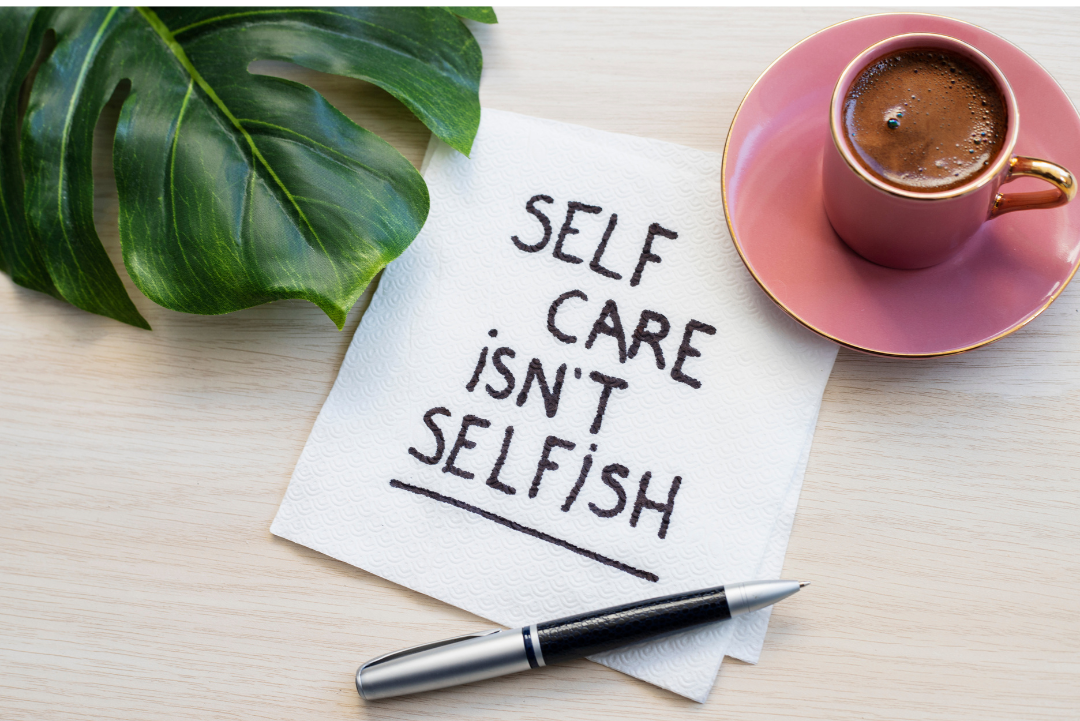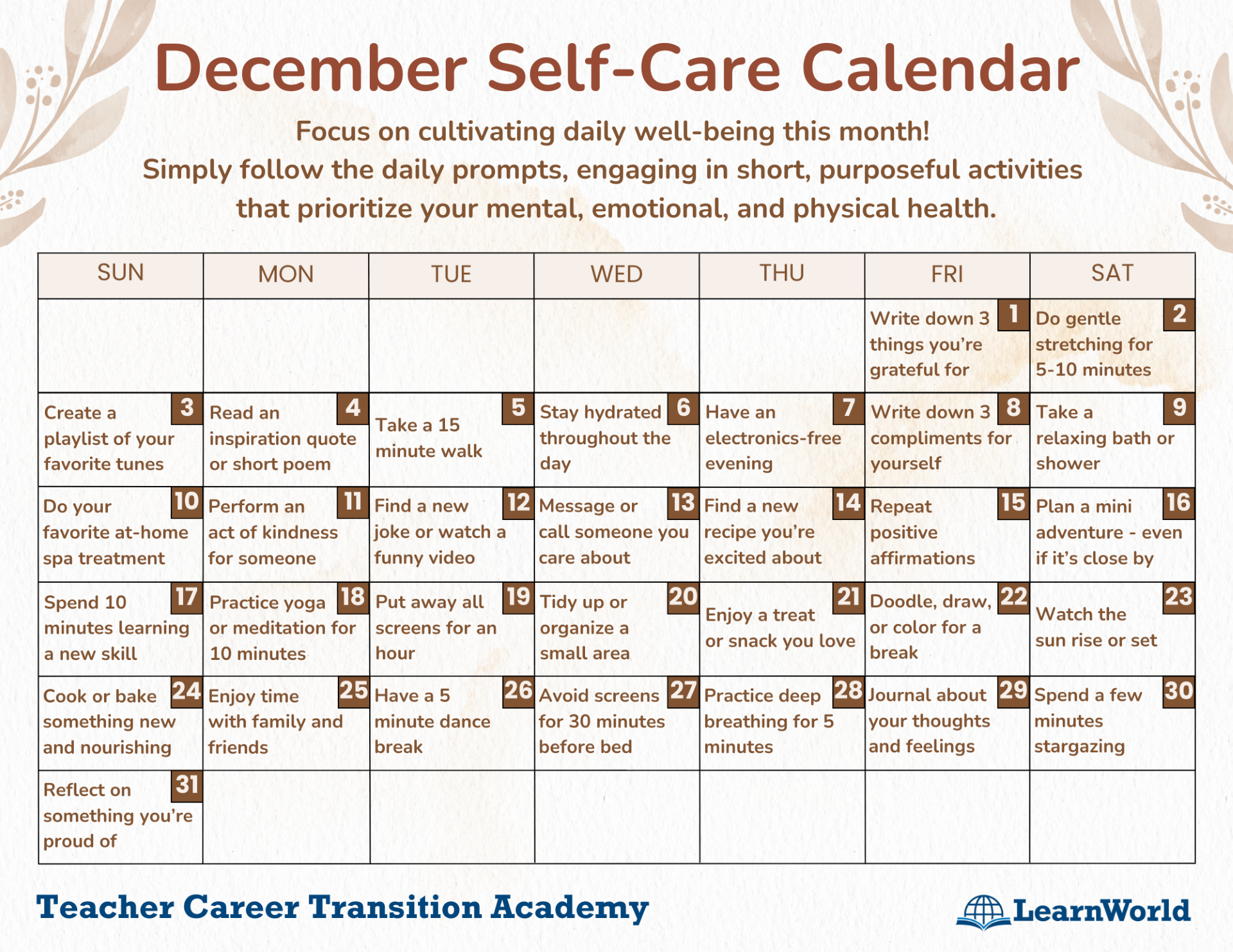
Embarking on a career transition can be an exciting yet challenging journey. For teachers transitioning to new professional paths, the demands of adapting to a different environment can sometimes lead to burnout. It's crucial to recognize the importance of self-care during this period to ensure a smooth and fulfilling transition. In this blog post, we'll explore the significance of making time for self-care, offer practical tips for maintaining well-being during the career transition process, and delve into strategies to prevent and combat burnout.
The Importance of Self-Care:
As teachers, you're accustomed to putting others' needs first, but neglecting your own well-being can have detrimental effects on your mental and physical health. Transitioning careers adds an extra layer of stress, making it essential to prioritize self-care. By taking intentional steps to nurture your well-being, you not only safeguard your health but also set the foundation for a successful career shift.
1. Acknowledge and Manage Stress:
Recognize the stressors associated with the career transition process. Whether it's adapting to a new work environment, learning new skills, or building a new professional network, acknowledging stress is the first step in managing it effectively. Implement stress-reducing activities such as mindfulness, deep breathing exercises, or meditation into your daily routine.
Example: Try incorporating a five-minute mindfulness session into your morning routine. Close your eyes, focus on your breath, and let go of any tension. This simple practice can help you start the day with a clear and calm mind.
2. Establish Boundaries:
During a career transition, it's easy to overcommit and blur the lines between work and personal life. Set clear boundaries to avoid burnout. Define specific work hours and commit to taking breaks. Creating a balance between your professional and personal life is essential for long-term well-being.
Example: Schedule breaks throughout your workday. Take a short walk, listen to your favorite music, or indulge in a chapter of a good book. These breaks can refresh your mind and improve overall productivity.
3. Prioritize Physical Health:
Exercise, nutrition, and adequate sleep play pivotal roles in maintaining overall health. Regular physical activity not only boosts your energy levels but also enhances your mood. Ensure you're nourishing your body with nutritious meals and prioritizing sufficient sleep to support your cognitive function and emotional resilience.
Example: Dedicate time to a form of exercise you enjoy, whether it's yoga, jogging, or dancing. Physical activity releases endorphins, which can positively impact your mood and reduce stress.
4. Cultivate a Support System:
Share your career transition journey with friends, family, or mentors who can provide guidance and support. Connecting with others who have experienced similar transitions can offer valuable insights and encouragement. Don't hesitate to seek professional assistance if you find yourself struggling to cope with the challenges.
Example: Schedule regular virtual or in-person meetups with friends or mentors. Share your experiences and actively listen to theirs. Social connections can provide a sense of belonging and emotional support.
5. Invest in Learning and Development:
Embrace the learning curve that comes with a career transition. Instead of viewing it as a source of stress, consider it an opportunity for personal and professional growth. Allocate time for continuous learning and skill development, and celebrate your achievements along the way.
Example: Set aside time each week for online courses or workshops related to your new career path. Not only does this enhance your skills, but it also boosts your confidence in your abilities.
6. Engage in Activities You Enjoy:
Make time for hobbies and activities that bring you joy and relaxation. Whether it's reading, gardening, or painting, engaging in activities you love helps alleviate stress and fosters a positive mindset. Schedule regular "me time" to recharge and rejuvenate.
Example: Dedicate a weekend morning to your favorite hobby, whether it's baking, gardening, or playing a musical instrument. This personal time allows you to unwind and reconnect with your passions.
Preventing Burnout:
In the midst of a career transition, the risk of burnout looms large. Burnout is characterized by emotional exhaustion, detachment, and a sense of reduced accomplishment. To prevent burnout, consider these strategies:
1. Regularly Assess Workload:
Periodically review your workload and commitments. Are there tasks that can be delegated or postponed? Ensure that your to-do list is realistic and manageable.
2. Delegate Responsibilities:
Don't be afraid to delegate tasks or seek support. Whether at work or home, sharing responsibilities can lighten the load and reduce the risk of burnout.
3. Set Realistic Expectations:
Establish achievable goals for yourself. It's okay to aim high, but ensure that your expectations align with the time and resources available.
4. Learn to Say No:
Recognize your limits and be comfortable saying no when necessary. Overcommitting can quickly lead to burnout.
5. Take Mental Health Breaks:
Schedule regular breaks to rest your mind. A short walk, a few moments of deep breathing, or a quick meditation session can make a significant difference.
Remember, preventing burnout is an ongoing process that requires self-awareness and proactive steps. By incorporating these strategies into your routine, you'll be better equipped to navigate the challenges of a career transition while maintaining your well-being.
December Self-Care Calendar:
To support you on your journey to well-being, we've included a December self-care calendar. This calendar provides you with a daily self-care activity to help combat burnout and promote a positive mindset. Take a moment each day to prioritize your mental and physical health, and let these activities serve as a reminder that your well-being is essential.

Navigating a career transition as a teacher requires resilience, adaptability, and a commitment to self-care. By recognizing the importance of your well-being, implementing practical self-care strategies, and actively preventing burnout, you can not only avoid the pitfalls but also thrive in your new professional journey. Remember, prioritizing yourself is not a luxury but a necessity for sustained success and fulfillment.





